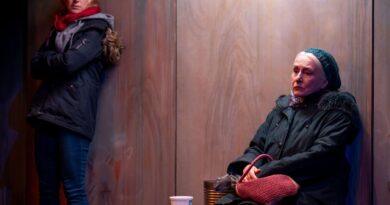Canadian Stage’s “The Shadow Whose Prey the Hunter Becomes” puts us in the crosshairs
“I don’t think they’re getting it”, the actors say more than once, peering into the audience.
An arch observation? A direct challenge? A dismissive burn?
Yes. Yes. And yes.

The Shadow Whose Prey the Hunter Becomes is a touring production by Australia’s Back to Back Theatre on stage now at Canadian Stage. When you hear that it features three actors with intellectual disabilities, you probably aren’t thinking that this is a piece of art you may not “get”.
But this play, which focuses on and is a product of neurodivergence, is – deliciously and subversively – not what you’re expecting. And there’s a lot to “get”.
It begins in a deceptively simple, low-key way. On a stark, almost bare stage, three people with intellectual disabilities gather to prepare for what appears to be a community meeting. The three, played by neurodivergent actors Scott Price, Simon Laherty and Sarah Mainwaring, seem to be meeting organizers. Based on their discussion, at least some of them will have speaking roles.
Their conversation is wide-ranging, embracing the personal, political, historical, even sexual. They discuss their disabilities, and much, much more. It’s educational. It’s vulnerable. It’s funny.
Scott (Scott Price) – who is gruff and cutting, yet insecure, yet self-assured – explains that he is autistic. Sarah (Sarah Mainwaring), whose speech is the slowest and whose movements are most laboured because of a brain injury – is relentless, impassioned, uncompromisingly self-sufficient, and always in motion. And meeting host Simon (Simon Laherty), who never discusses his disability, is quirky, earnest and charming.
The actors’ authenticity – and it’s important to note that they are co-authors of the play – brings a palpable sincerity and dignity to the stage. Every divergent gesture and movement, and every impassioned, frustrated or cutting word (captured by surtitles to aid audiences who may struggle to understand the actors) resonates with profound meaning. Themes of autonomy, dignity, and the human desire for connection weave through the narrative.
But this community meeting, this play, even these actors are not what we think they are. Because at the same time we’re appreciating them and rooting for them, a part of us is quietly underestimating and unwittingly patronizing them.
The three actors see this. They see us.

And so inexorably, with dignified insistence, they turn the tables. They confront societal attitudes towards disability. They ask about prejudice, understanding, and universal human experience. And then, in a deconstructive move torn from today’s headlines, they look us in the eye and ask us to take an excursion into the AI-inflected, AI-infected future.
To ponder our place in that brave new world.
They launch one pointed question after another. Like flaming arrows, they set audience synapses aflame.
Because they’re not who we think they are. And nor are we who we so comfortably thought we were.
The show itself is like the play’s title: evocative, provocative and confounding. Director Bruce Gadwin explains that the title originates in a Charles Perrault folktale. Even so, I found myself staring at the playbill after the show. That title is slippery.
To derive a meaning that I could hold in my head, I had to re-order its words. When I simplified the syntax of “The Shadow Whose Prey the Hunter Becomes” I got “The Hunter becomes the prey of the Shadow.”
So . . . there’s a reversal or transposition of roles, where the hunter becomes the prey.
In our comfortable seats, we “normal” humans feel like the would-be hunter. But if so, who is our shadow, who is making us their prey?
Is it Simon, Sarah and Scott – whose disabilities are usually perceived as failings that make them collectively vulnerable or dependent, but who reveal themselves to be incisive, caring, unique individuals?
Well, they do have us in their sightlines, and they’re not afraid to unload.
Or is our shadow the spectre of artificial intelligence? That force of exponential automation and homogenization that we have so casually unleashed on the world, and which threatens to make everyone’s most noble efforts and personal points of pride seem redundant, unnecessary . . . inadequate.

The Shadow Whose Prey the Hunter Becomes is a thought-provoking, unflinchingly honest journey through discomfort, enlightenment, confusion and empathy. It challenges us to reconsider our perspectives on disability, intelligence, and the essence of human connection. And it leaves us to reflect – not just on our own perceptions and biases – but on the existential question of our individual and collective value in this world we have made.
I don’t know if I got it. Really got it.
But I’m definitely looking for my shadow.
The Shadow Whose Prey the Hunter Becomes is on stage until January 28, 2024. Reserve tickets on canadianstage.com.
© Scott Sneddon, Sesayarts Magazine, 2023
About The Author
Scott Sneddon
Scott Sneddon is Senior Editor on SesayArts Magazine, where he is also a critic and contributor.
Visit About Us > Meet the Team to read Scott’s full bio …




